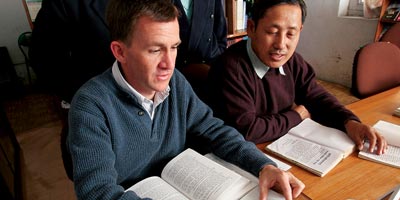 |
|
Spring 2007 | Volume 30, Number 1
| Features
|
|
|
Found in Translation
Alumni help render the Scriptures in a people’s “Heart Language”

Jeff Webster (front left) works with three of the five Branchu translators on the team, all of whom have completed Bible school and pastored churches.
Though Jeff Webster ’85 works out of an old converted storeroom behind his two-story, mud-brick home, the Seattle Pacific University graduate is content with being a Bible translator. “There is no better way of demonstrating God’s love for people than by learning their language and leaving them a written
legacy of God’s word,” he says. So important is this conviction to Jeff and his wife, Laura Beth Whitman Webster ’86, that they and their three sons reside in the foothills of the Himalayan Mountains, their lives devoted to painstakingly converting the Christian Scriptures into the minority Branchu* language.
Bible translation may be less than glamorous, but for the Websters it has the potential to transform an entire people group by communicating the message
of the Bible and at the same time preserving a language previously found in little or no written form. In addition to teaching at an international Christian school, Laura Beth Webster looks after Caleb (14), Luke (12), and Joshua (9), while Jeff Webster works side-by-side with a team of Branchu pastors crafting a New
Testament translation for a vibrant young church.
Such a translation project, says the former sociology/anthropology major, generally takes 10–25 years to complete and requires an enormous amount of biblical exegesis, linguistic comparisons, oral drafts, transcription, revision, keyboarding, consultation, church committee review, and villager comprehension surveys. When the task is finished, he estimates that an average of 79 minutes will have been spent on each of the 7,956 verses of the Branchu New Testament.
Webster took three years learning the language and culture
and training the team before it began Bible translation in 1999.
A determined, methodical patience soon became critical: “The work is more challenging than we ever imagined,” he explains. “We really only had a tiny and naïve glimpse of what we were getting into.” Now about 80 percent complete, the Branchu New Testament is scheduled for publication in 2009.
It was the guidance of SPU Professor of Anthropology Ken Tollefson and the opportunity to accompany him on field visits to interview elderly Native Americans that helped the pre-engineering transfer student discover his “niche
in the Kingdom.” “I was impressed by how Dr. Tollefson’s scholarship served the people in very practical ways,” he recalls.
“It takes an intellectual to do Bible translation; they say a person needs an IQ of 130 or higher,” notes Tollefson, now retired. For Webster, the profession demands what he calls “a fascinating blend of the scientific, the technical, and the spiritual.” The two men remain in touch, and Tollefson continues to provide modest financial support for his former student’s translation work. “Look what the martyrs went through to share the Bible,” says Tollefson. “To them, there was nothing of more value than the Word.”
Next Page 1 of 2
Back to the top
Back to Features Home
|
| |
|
 |
|
 |